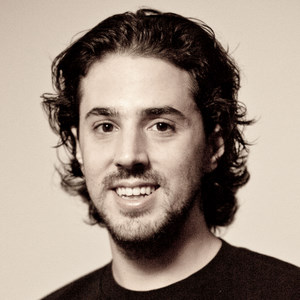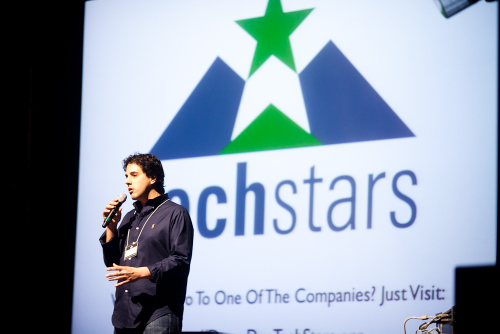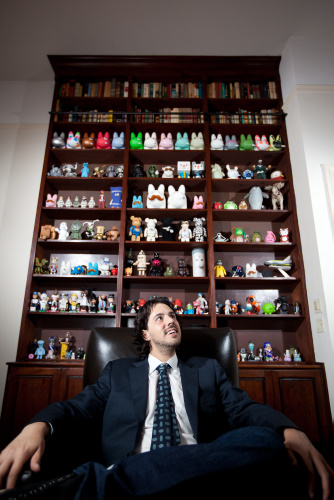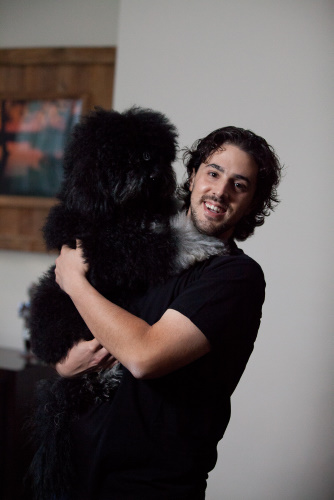- Learn How Techstars Chooses Who Enters Its Programs
- Find Out How Techstars Really Helps Founders And If They Add Value
- Discover How The Techstars Mentor Program Works From Both Sides
Full Interview Audio and Transcript

Personal Info
Sports Teams: NY Giants and NY Rangers
Favourite Books:
Favourite Entrepreneurs: Steve Jobs, Mark Zuckerberg
Twitter: http://twitter.com/davetisch
Personal Blog: http://davidtisch.com
Company Website: http://techstars.com
Interview Highlights
This is a condensed audio transcript. The full source audio is provided if needed. The interviewee may post corrections in the comments.
Adrian Bye: Today we’re here with David from TechStars. David, before we talk about TechStars, tell us a little bit about yourself.
David Tisch: I went to the University of Pennsylvania, and got an American History degree. I graduated law school, and quickly retired from the law. I think I lasted about 10 minutes. I ended up working for a public real estate company called Vornado. I was there for about a year before I left to go do an internet start-up in 2006, in the group buying space. That was with two friends, and we got about six months deep when I realized they were the wrong partners and I had no idea what I was doing.
I packed it up and joined a company called KGB, a global information services company. I reported directly to the CEO, and ran the internet division of the company, starting a couple new businesses, and helping out with some M&A. I built a start-up at KGB, called knowmore.
I left there in 2009, and started doing a lot more angel investing. I met David Cohen eight months later, at a conference, and I joined the company about a month later.
Adrian Bye: Can you tell us a little about TechStars?
David Tisch: Techstars is a seed stage accelerator program. We’re sort of a boot camp for startups. In New York, for this current program we are running, we had 1200 applications. We took 12 of those companies into the program.
We give each of the companies a small amount of money, in return for a small slice of equity. We work with the company in our offices for about three and a half months, surrounding them with mentorship from the community. We’re in 4 cities now – Boulder, CO; Seattle, WA; Boston, MA; and New York – each of our cities the program is supported by the local community. We raise money from the local community and the mentors in each city are locally based.
In New York, we have 120 mentors. People like Fred Wilson, Dennis Crowley, Chris Dickson, the CFO of Sony, etc. who come in and meet with our companies throughout the program, trying to help them get better before Demo Day. Demo Day is at the end of the program where the companies get on stage in front of 500 investors and present what they have done for the past three months.
Adrian Bye: How has that been working out?
David Tisch: We’ve funded about 90 companies over the past couple years. 85% of those go on to raise venture capital funding, and 8 out of the first 20 have been acquired.
Adrian Bye: Y Combinator seems to be the pioneering company in this sort of space. There are a couple others that look like they are going to do extremely well.
David Tisch: I think there are great companies that have come out of there. They run an incredibly cool program. I think the main difference is our focus on mentorship and our focus on bringing people from the community in to work with the startups.
Adrian Bye: Can you explain more about how that works?
David Tisch: In New York, we have about 120 mentors. The ask from me to them is to come once in the first couple of weeks of the program, and meet between 4 and 10 of the companies, with the goal of picking one that they like. The companies meet upwards of 50 or 60 mentors during that first month, and their goal is to pick the ones that they like. At the end of that process, which we call “mentor dating”, each company has between 5 and 10 lead mentors, that they work with throughout the rest of the program. The goal is to have deep engagement from people who have been there and done that before, from people who just want to work with early stage companies and help them as they were probably helped getting to where they got to.
It’s an incredibly powerful model. We’ve seen successful entrepreneurs work with first time, second time entrepreneurs and really help transform their businesses in ways that you couldn’t do on your own. It would take years to get the amount of meetings and networks that you end up building within the three month period.
Adrian Bye: Why do the mentors come in and do that? What is their return out of it?
David Tisch: I think each mentor is totally different. We have some mentors who are investors getting to spend time with the deal before they conceivably do it. We have other successful entrepreneurs who would love to work with early stage companies but don’t have a filtering mechanism of their own. What we do is narrow down 1200 to 12 and then we ask them to narrow down 12 to 1. We’ve done all that legwork to make sure that they’re spending relevant time with a relevant company that will ideally be there in a year, with quality entrepreneurs.
Adrian Bye: But there is no direct economic value? The value is the filtering, the understanding, the business access, the potential business opportunities?
David Tisch: It’s the network, more than anything, in the community. This is an incredibly tight community, with forces around the country. We have over 250 mentors in our system and have over 3000 entrepreneurs that are applying to this program in a year. There’s incredible access and it is access to each other that I think everybody is excited about.
Adrian Bye: Are the mentors meeting with the startups weekly? What actual support is in place?
David Tisch: Some mentors will schedule a weekly visit to the office, others will do a Skype call or a phone call or ask the company to come up to their office. Once you set up the one on one match, it is up to you how you engage. There are other mentors that will make incredibly key introductions, and not spend a ton of time directly with the company.
It is about utilizing your mentor for what they are able to bring, and really accessing their best value. It is about building long term relationships, so it is not just an engagement for three and a half months.
Adrian Bye: How many companies at a time is a mentor typically mentoring?
David Tisch: Just one. The ask is not to dive wide or to work with multiple companies, it is to find one that you like, one that you have some passion, some interest in genuinely, or the entrepreneur that you really like, and work with them and them only. Diving deep with one versus shallow with multiple is a model that we believe works better.
Adrian Bye: Can you talk about the experience for a startup team? What happens through your process?
David Tisch: They go through the application process, which involves a series of interviews, conversations, emails, and some significant vetting towards the end.
The program, as we look at it, is really 3 one month programs. The first month, it is about finding mentors and finding people to surround your company with. The second month, it is about working with all those people, executing the business, and executing the product. Month three is focused on post-TechStars strategy. A lot of the companies will be raising money, and preparing for Demo Day. There is also a focus on branding, marketing, and media. Anything we can help the companies with to make them succeed when they leave the program and to hit the ground running as fast as they can.
We really try to respect the company’s time and only surround them with the most valuable information and talks and engagements that we can.
Adrian Bye: In that three and a half months, how many hours of contact is a typical startup going to have with TechStars?
David Tisch: They actually work out of the office every day, as do I, so there are some days when we are spending 3 or 4 hours with one company trying to work on some challenging problem they are encountering. We have a weekly meeting with each of the companies, so I will personally sit there for an hour with each company and every week check in with where they are at and help them with their problems, help them navigate the program, whatever it is that I can do to help them take more advantage of what we are surrounding them with.
Post-TechStars too, this doesn’t end after three and a half months, we have an incredibly strong alumni network. We are investors in these companies, and so we’re regularly involved with the companies after the program as well.
Adrian Bye: They get office space for three and a half months?
David Tisch: We have upwards of $200,000-300,000 worth of free services that the companies get. There is a ton of free stuff around the program, and it’s because companies like Amazon believe that the startups that we’re funding are incredibly high quality and want to work with those people for long points of time. So, whether it’s free legal, free Amazon, free Heroku, free Google apps, free banking, a lot of companies are willing to give our companies more because they understand that the value will come back to them later.
Adrian Bye: What about for experienced entrepreneurs? Would they want to go through TechStars or is that not a fit for them?
David Tisch: This program is not just for a couple kids with an idea. In the past two years, in New York, we’ve had a company each year come into the program already having raised $1,000,000. They raised that money before the program, and still came in, taking the same deal as everybody else, because they see the potential for growth through this program being exponentially better than on their own.
Even a multi-time entrepreneur starting that company every time has significant challenges and needs to make sure they are going down the right path with the right offering. This program gives them a feedback mechanism and a feedback loop that’s unprecedented.
Adrian Bye: What does the outlook look like for an alumni?
David Tisch: We have an incredibly active Facebook group for all of our alumni. Additionally, every year we run a reunion. To me, the powerful moment for me in this organization was the first event I ever went to after I joined TechStars – the alumni reunion in New York last year. This was before our first New York program, so there were only 3 companies, out of the 70 companies that went through TechStars, that were actually based in New York. We had 63 companies show up at that reunion. We had 63 companies get on a plane or in a car and get to New York, just to come for one day to hang out with each other. That, to me, was the real indication of the strength of this community. That everybody looks back on a very short amount of time, and yet cherishes it enough to really be incredibly active in this community. I thought that was incredible.
Adrian Bye: How does the vetting process work? What are you looking for?
David Tisch: We look at team first, team second, team third, then market, and then the idea. It is counter-intuitive to a lot of entrepreneurs, but the idea is the last thing we look at. Is this a great team working in a really interesting market? That’s the crux of what we’re looking for. How do you show you’re a great team? You’ve done something in the past to indicate that you can execute on what you say you are going to do in the future. So, if you’ve been at Google as a senior engineer on a project that is incredibly successful and you are leaving to go build something that’s tangentially related, we have confidence that you can build it. If you’ve built two companies before or you’ve built some products in college to show off what you can do and they got a little traction, those are indications that you are able to execute on what you want to execute on in this program. If you’ve never built anything before, it’s what have you built for this current product? If you are just an idea and have never executed anything before, it’s incredibly tough if not next to impossible to get into the program. We are really looking for indications that these teams can execute at an incredibly high quality on the idea that they are applying to TechStars with.
Adrian Bye: On Demo Day, all of the investors are there. They have to compete on deals so that can generate some heat, and it works out well for you guys too.
David Tisch: In a good market, you are going to have investors fighting to get into deals and fighting to find entrepreneurs. We tell our entrepreneurs very often that it is not about raising money, it is about working with great people, on the investor side too. Finding investors that you believe in and that believe in you, that you really get along with, and see yourself having the ability to work with for 5-10 years is vital. Ideally, TechStars provides the framework to get to know investors and really build those relationships over time so that by the time you’re signing a term sheet, you’re confident that you are signing with the right people.
Adrian Bye: What do you think of the current economy?
David Tisch: I’m excited for this time, I think there’s incredible innovation going on, I think there’s massive disruption in a lot of old industries and there is real revenue in a lot of these companies. Whether there are too many companies, potentially, but I sit here and put 20 or 50 into an ecosystem every year, and I’m probably part of that challenge. But, I think that funding innovation and allowing innovation to thrive is fantastic. Is every one of these companies going to succeed? No. But, are the great ones going to be great companies? 100%. And that’s how I would look at the broader picture of things.









